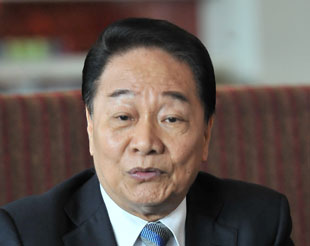
Dato Sri Wong Soon Koh
KUCHING: The state government will take over waste disposal in the rural areas from the Ministry of Local Government, knowing fully well the magnitude of the problem and the failure in handling it.
A committee will be formed under State Secretary Tan Sri Datuk Amar Mohd Morshidi Abdul Ghani to look into the issue.
About half of the state’s population of 2.6 million people live in the rural areas where sewage or waste management system is lacking. The villagers have been resorting to dump their daily waste into rivers and streams.
Former minister of local government and community development Dato Sri Wong Soon Koh said the problem was that most dumping sites had already exceeded their limits and new dumping grounds were hard to find.
“There is no more available land to be used as dumping grounds. Even if there is, there would be strong objections from villagers in the vicinity. It is near impossible now to find a no man’s land which we can use as dumping sites,” he said.
He said due to the magnitude of the problem which included the need for large amount of funding, the state government had taken over the issue from the Ministry of Local Government where Morshidi would form a state committee to undertake the work.
“There is a cabinet proposal on the issue which has been deliberated. So we have to wait for the outcome,” Wong said.
However, he warned that it would be a challenge for the government to tackle the issue as most longhouses and villages in the rural areas were isolated and scattered over a large area.
It is estimated that there are at least 5,000 villages and longhouses in rural Sarawak.
Meanwhile, Assistant Minister for Local Government Datu Dr Penguang Manggil said the government must start addressing the issue seriously because if it were left unattended, it would cause massive environmental and health crisis in the near future.
“You can see one clear example in the Rajang River which has been turned into a waste disposal site. So we have to look into ways on how best to address the issue,” he said.
He added that besides education, the rural people could also implement their own waste disposal system (grounds) in their respective longhouses and villages.
“The local council can help to identify suitable places for the purpose to ensure they would have minimum impact on the environment,” he said.
Penguang, a former permanent secretary to the Ministry of Local Government for seven years and NREB controller for three years believed that education was paramount for everyone to look after the environment well.
“The current situation is already very bad. So we have to tell the people to be proactive and not to be careless. We only have one planet we can home. So we better take care of it well.”
He also urged the people to start using degradable materials to dispose their rubbish.
“Also, most of our rubbish can be turned into compost which will minimise our waste,” he said.
On sewerage, Penguang said septic tanks in rural areas ideally had to be de-sludged properly to ensure the environment was not affected.
“I will bring up these issues to the state government and hope that we can find sustainable and viable solutions,” he added.
